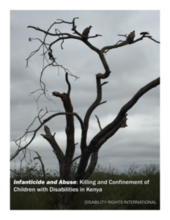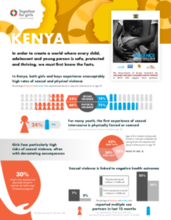This country page features an interactive, icon-based data dashboard providing a national-level overview of the status of children’s care and care reform efforts (a “Country Care Snapshot”), along with a list of resources and organizations in the country.
demographic_data
childrens_living_arrangement
children_living_without_bio
adoption
social_work_force
key_stakeholders
Key Stakeholders
Add New DataOther Relevant Reforms
Add New Datadrivers_of_institutionalisation
Drivers of Institutionaliziation
Add New Datakey_research_and_information
Key Data Sources
Add New DataChildren's Act, 2022 (Kenya)
Prevalence and number of children living in institutional care: global, regional, and country estimates
Social Protection and Disability in Kenya
Kenya Social Protection Sector Review
Country Care Review: Kenya
Child Developmental Disabilities, Caregivers’ Role in Kenya and Its Implications on Global Migration
Research findings on Alternative care system in Kenya for children without parental care
Charitable Children Institutions in Kenya: Factors Influencing Institutionalization of Children
Acknowledgements
Data for this country care snapshot was contributed by consultants with Maestral International.
Displaying 281 - 290 of 447
This video from Focus in Africa, BBC World News highlights findings from a recent Disability Rights International (DRI) report which explores the practice of infanticide of children born with disabilities in Kenya.
New research has revealed that nearly half of Kenyan mothers with disabled babies are pressured to kill them.
This article from Thomas Reuters Foundation News highlights findings from a recent study by Disability Rights International which explored the stigma around children with disabilities in Kenya, and the ways in which that stigma leads to child abandonment, institutionalization, and even infanticide.
This report is the product of a two-year investigation by Disability Rights International (DRI) into institutions and orphanages across Kenya. The report describes the "egregious human rights violations" perpetrated against children with disabilities in Kenya, particularly those who are confined to institutions and "orphanages."
This Op-Ed from Kenya's Daily Nation by Simon Njoroge paints a staggering picture of violations of human rights by child institutions.
This qualitative study explored life experiences of children living on the streets in Eldoret, Kenya.
The Child Protection Research Technical Working Group (RTWG) of the Department of Children Services (DCS) is organizing the 1st International Conference on Child Protection in Africa.
This fact sheet presents country-specific data from the Violence Against Children Survey (VACS) in Kenya.
The objective of this study was to determine if a school support intervention for adolescent orphans in Kenya had effects on mental health, a secondary outcome.
This piece from the Daily Nation finds "strong evidence" of orphanage trafficking in Kenya.


